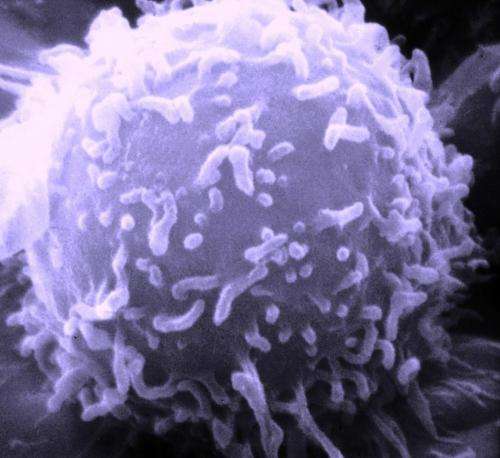'Outstanding' results announced from new blood cancer study

Scientists have described new results of a blood cancer study as 'outstanding' in tackling previously untreatable forms of chronic lymphocytic leukaemia (CLL).
The advance led by a team from the University of Leicester and University Hospitals of Leicester NHS Trust, within the Hope Clinical Trials Facility, focused on treating patients with CLL.
It follows on from a world-first clinical trial of a new drug to treat particular blood cancers. Results of that international clinical trial, led by Dr Harriet Walter and Professor Martin Dyer were published in the journal Blood in November 2015 and looked at the efficacy of a new inhibitor, ONO/GS-4059, in the treatment of CLL and Non-Hodgkin Lymphoma patients, refractory or resistant to current chemotherapies.
ONO/GS-4059 targets BTK, a protein essential for the survival and proliferation of the tumour cells.
The study opened in January 2012 and 90 patients were enrolled in different centres in the UK and in France, with 28 coming from Leicester. Patients with CLL showed the best response and most of them were still on the study after 3 years, and remarkably without notable toxicities.
In the new paper, the researchers are reporting for the long-term follow-up results. Their work, published in the journal Blood, was funded by the Ernest and Helen Scott Haematological Research Institute, ONO Pharmaceuticals, Gilead Pharmaceuticals and the Cancer Research UK Leicester Experimental Cancer Medicine Centre. Local charity Hope Against Cancer fund the Clinical Trials Facility based at the Leicester Royal Infirmary.
Professor Martin Dyer is Professor of Haemato-Oncology in the Department of Cancer Studies at the University of Leicester and Honorary Consultant Physician in the Department of Haematology at Leicester Royal Infirmary.
He said: "This current paper describes the long term follow up and shows that in patients with CLL the remissions are durable and associated with no new toxicities. Furthermore, in collaboration with Sistemas Genomicos, a company in Valencia, we have shown that mutations associated with aggressive disease respond well to treatment with ONO/GS-4059.
"Our long term follow up shows maintained efficacy without toxicity. This study is the first report of long term follow-up of a selective BTK inhibitor – and it is excellent news for patients.
"The results we are presenting are based on an international clinical study involving the UK, France, Japan and US – and led by Leicester.
This was a Phase 1 clinical study which means the researchers are in the early stages of testing the drug's effectiveness.
"We are now doing studies of ONO/GS-4059 in combination with other precision medicines to assess whether these results can be enhanced in patients with CLL and other B cell malignancies."
Local cancer research charity, Hope Against Cancer, has been funding some of Professor Dyer's work. Chief Executive of the charity, Nigel Rose said: "Professor Dyer is a long-standing collaborator and recipient of Hope's funding. We are delighted that this is being put to such extremely important use in meeting our charity's mission of improving the lives of cancer patients locally."
More information: Harriet S. Walter et al. Long-term follow-up of patients with CLL treated with the selective Bruton's tyrosine kinase inhibitor ONO/GS-4059, Blood (2017). DOI: 10.1182/blood-2017-02-765115

















